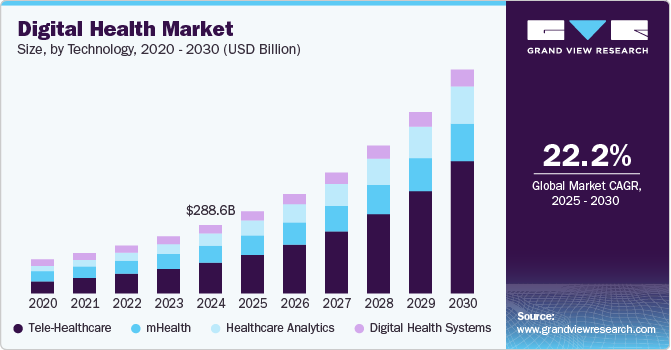Digital technologies are highly integrated into our lives, and innovations are helping us, including our health & well-being. The outbreak of COVID-19 highlighted weaknesses in the healthcare system and accelerated more innovations in healthcare. The U.S. Government Accountability Office observed patients across five states, and the study found that telehealth services surged from the pre-pandemic level of over 2 million to 32 million in February 2021. This effect is observed worldwide due to digital technology improving healthcare. It encompasses various tools and solutions, such as telemedicine, remote monitoring devices, electronic health records, patient portals, mobile health & wellbeing apps, and wearable devices.
Popularity of Digital Healthcare
Digital healthcare tools are helpful for providing easy access to healthcare services. These digital services offer low-cost healthcare solutions and personalized healthcare for patients. Mostly, these digital healthcare solutions are connected to the Internet and also sometimes provide virtual care through cloud technology. There are many mobile-friendly apps available that allow patients to easily health monitoring features. Users can analyze metrics such as oxygen levels, stress levels, heart rate, and sleep patterns with just one click on a smartphone. Additionally, wearable smart devices, like smartwatches, also enable patients to track these important health indicators.
The global digital health market is expected to reach $946.04 billion by 2030, with a growth rate of over 22% from 2025 to 2030. The global market growth is attributed to not just technology innovations but also the rising number of geriatric patients, the spike in medical costs, and the government’s policy push to expand healthcare services for all. Similarly, people across the globe are shifting their focus on preventive healthcare measures, and that is resulting in the growth of smartphone health applications.
“In 2024, U.S. digital health startups received over $10 billion in funding, as confirmed by the Venture Capital Organization, Rock Health.”
Popular Digital Health Tools & Technologies
Health information management tools help store, process, and analyze patient health information. These tools can be electronic health records (EHRs) or patient portals, which are online platforms that provide access to healthcare records and diagnosis records. Similarly, these tools also keep a patient's medical history, schedule physio or doctor appointments, communicate with healthcare institutions, and manage other health information.
Telehealth or telemedicine offers patients medical consultation via phone call or virtual e-meet with the doctor. This technology helps doctors and patients connect digitally to any remote location. Moreover, the technology allows remote monitoring of patients, provides e-prescriptions, and serves the healthcare needs of patients by getting medical advice from anywhere with more convenience.
Wearable devices are trending worldwide, but they're not just fashion. These devices help individuals track their health and are also largely adopted for preventive healthcare. Such devices are worn on the body to derive and monitor an individual's health information. They empower patients to make informed decisions and also help doctors treat the patient better. The market has many brands that offer fitness-tracking devices, smartwatches, and sensors-enabled tools to track patients' health conditions, such as glucose monitoring tools for diabetic patients.
Finally:
Digital health tools represent a significant advancement in the well-being of humanity. As the global population continues to grow, due to increasing demand for innovative healthcare, tools can be used to get easy access to basic medical assistance. Furthermore, digital health technologies assist individuals in obtaining quick health diagnoses, accessing medical advice from remote locations, and monitoring ongoing health conditions remotely. The global healthcare industry is witnessing a shortage of professionals, and the use of technology can facilitate the sharing of expertise digitally during challenging times. Therefore, the adoption of digital health tools and technology empowers individuals and medical practitioners to contribute to a healthier society and a smarter tomorrow.
Get a preview of the latest developments in the Global Digital Health Market! Download your FREE sample PDF today and explore key data and trends
